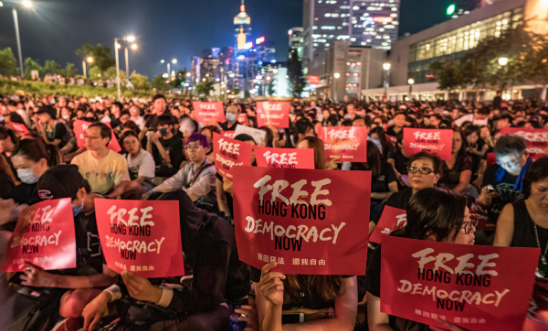
Press releases
Hong Kong: 80% of people convicted under ‘draconian’ national security law should never have been charged - new research

Five years since National Security Law enacted, new research reveals its ‘alarming’ impact
Nearly 90% of people charged were denied bail
UK and other governments need to step up and press for the law to be scrapped
‘This unjust law reaches far beyond Hong Kong’s borders, threatening Hong Kong activists and students in the UK and throughout the world’ – Sacha Deshmukh
More than 80% of people convicted under Hong Kong’s National Security Law have been wrongly criminalised and should never have been charged in the first place, according to new research by Amnesty International published today - five years since the law was enacted.
Amnesty’s analysis of 255 people targeted under the draconian law in Hong Kong since 30 June 2020 also showed that bail was denied in almost 90% of cases where charges were brought, and that those denied bail were forced to spend an average of 11 months in detention before facing trial.
The briefing paper analyses patterns in arrests, bail decisions and prosecutions under the National Security Law and other national security legislation, highlighting three major concerns: the criminalisation of the legitimate exercise of the human right to freedom of expression; the low bail grant rates in these cases; and the de facto long-term imprisonment of most accused.
The analysis found that of the 78 concluded cases under the National Security Law, at least 66 (84.6%) involved legitimate expression where there was no evidence of violent conduct or incitement and should not have been criminalised according to international standards.
When concluded cases under Article 23 and pre-Article 23 “sedition” offences are included, at least 108 out of a total of 127 cases (85%) involved similarly legitimate forms of expression which were unjustly prosecuted. These cases fall well short of the high threshold required for criminalisation under international standards.
The courts denied bail in 129 national security cases, or 89% of those in which individuals were charged, according to Amnesty’s data.
Among the 129 cases where bail was denied, the average length of detention was 328 days. Fifty-two cases (40.3%) involved detentions lasting one year or more before trial or a guilty plea.
Sarah Brooks, Amnesty International’s China Director, said:
“Five years after the enactment of the National Security Law, our alarming findings show that the fears we raised about this law in 2020 have been realised. The Hong Kong government must stop using the pretext of ‘national security’ to punish legitimate expression.
“This draconian law, and the other national security legislation it spawned, has corroded key legal safeguards that once formed the foundation for protecting human rights and the rule of law in Hong Kong. The result has been a devastation of Hongkongers’ ability to express themselves without fear of arrest.
“The National Security Law has transformed Hong Kong from a city of tolerance and open debate into a city of repression and self-censorship. Our analysis shows that Hong Kong’s national security framework is not just a flagrant violation of international human rights standards on paper but that authorities misuse it to target opposition voices and foster an environment of fear.
“This research demonstrates that the vast majority of those charged with national security offences have acted entirely within their rights. Other governments should step up and use their influence to urgently press the Hong Kong and Chinese authorities to repeal the law.
“In the interim, the Hong Kong government should stop applying national security legislation immediately. At the very least they need to reinstate the presumption of bail in favour of release pending trial. No one should be made to languish in jail simply for exercising their right to freedom of expression.”
Sacha Deshmukh, Amnesty International UK’s Chief Executive, said:
“This unjust law reaches far beyond Hong Kong’s borders, threatening Hong Kong activists and students in the UK and throughout the world.
“The UK Government’s insistence following its China audit that the National Security Law must be scrapped is welcome, but it must be clearer to these communities in the UK how it will protect their right to freedom of expression and protest and keep them safe from the long reach of Hong Kong and China, including monitoring cases of transnational repression and improving the ways they can be reported.
“It is vital the Government continues to pressure Hong Kong to scrap this brutal law and immediately release UK national Jimmy Lai, Hong Kong lawyer-activist Chow Hang-tung and all others being unjustly imprisoned under it.
“The pursuit of trade and business interests must not stop frank conversations on human rights, which need to be central to any diplomatic engagement.”
A city of repression
Human rights in Hong Kong have deteriorated at an alarming pace since the National Security Law was imposed. Civil society has been effectively dismantled, while long-standing rights — including the rights to freedom of expression, peaceful assembly and association — have been severely curtailed.
Amnesty’s analysis covered the cases of 255 individuals who, between 30 June 2020 and 31 May 2025, were arrested for and/or charged with any offences under the Law; parts 1 and 2 of the city’s Crimes Ordinance that define the colonial-era offence of “sedition”; and the Article 23 law (also known as the Safeguarding National Security Ordinance), which replaced parts 1 and 2 of the Crimes Ordinance when it entered into force on 23 March 2024.
Amnesty sent the briefing to the Hong Kong government, which dismissed the findings as a “distortion of the reality” and said the National Security Law “has restored the enjoyment of rights and freedoms” in Hong Kong.